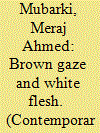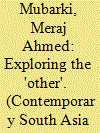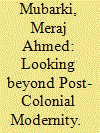| Srl | Item |
| 1 |
ID:
147384


|
|
|
|
|
| Summary/Abstract |
This paper posits that the contemporary (re)configuration of the generic white woman of Hindi cinema solely as a spectacle was produced by the nationalist discourse during the colonial encounter. This essay explores both the textual analyses and aesthetic strategies employed in the construction of national imagery of white female subjectivities. My approach is twofold: (i) to chart the historical specificities of the representational construct of the white woman through discontinuous changes occurring across Bombay cinema, and (ii) to explore the white female subjectivities across specific historical and cultural milieu. This paper probes the historicity of the ‘Otherness’ of the white woman in Hindi cinema reviews and re-examines how Hindi cinema constitutes female whiteness. I posit that the representation of the white woman in Hindi cinema as promiscuous and sexually available was constructed within the nationalist discourse of the colonial era and is a continuation of the white memsahib in her absence. It is my position that all that was ‘repressed’ in the Hindu woman resurfaces in the white woman – the racial, sexual ‘Other’, onto whom everything repressed within the self could be projected.
|
|
|
|
|
|
|
|
|
|
|
|
|
|
|
|
| 2 |
ID:
133098


|
|
|
|
|
| Publication |
2014.
|
| Summary/Abstract |
The aim of this paper is to explore Hindu-Muslim relations through the cinematic register of on-screen inter-faith marriages, and critique the undercurrent of 'Otherness' that undergirds most of these narratives in the post-Hindutva milieu. Since the Hindu female embodies the (Hindu) nation in popular imagination, Muslim males gain access to Hindu females only within narrations of perfidy and 'inappropriate appropriation', signifying their perceived 'Otherness'. The cohabitation of the Muslim female with a Hindu male, on the other hand, is framed within quotidian love narratives and marks her homecoming or gharwaapsi. Even as it offers national integration as its central motif, Jodhaa Akbar (JA) offers a narrative in which Akbar must be sufficiently indigenized and homogenized to merit absorption into the nation. JA both participates in and responds to the construction of this 'Otherness', as I shall demonstrate. While charting a new cartography of cinematic terrain where the faith of a minority group occupies the centre stage, JA nevertheless presents a Hindutva polemic aware of accusations of self-aggrandizement and thus amenable to hegemonic concerns.
|
|
|
|
|
|
|
|
|
|
|
|
|
|
|
|
| 3 |
ID:
163812


|
|
|
|
|
| Summary/Abstract |
Sanjay Srivastava’s rational, scientific hero, who emerged in the immediate post-colonial Hindi cinema of the 1950s, was strongly linked to the Indian government’s Soviet-style Five-Year Plans. Rigorous town planning and large-scale socio-urban experiments created the conditions for the cosmopolitan, Westernised filmic hero to acquire a hegemonic position within the discursive practices of the Nehruvian state. However, he was by no means the only embodiment of masculinity on offer. Employing narrative analyses of two key Hindi films of the period, I posit that there were competing visions of masculinity, not aligned with, but rather opposed to, the hegemonic discourse of metropolitan culture and cosmopolitan outlook of Nehruvianism.
|
|
|
|
|
|
|
|
|
|
|
|
|
|
|
|